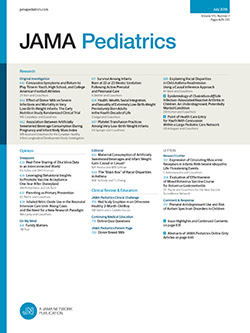胎儿先天性心脏病孕妇的不良产科结果
IF 24.7
1区 医学
Q1 PEDIATRICS
引用次数: 0
摘要
重要性了解胎儿先天性心脏缺陷(MCHDs)妊娠期产科并发症的风险概况对产科咨询和护理至关重要。目的探讨妊娠合并胎儿MCHDs发生胎盘相关不良产科结局的风险。设计、环境和参与者本队列研究从丹麦胎儿医学数据库中检索了2008年6月1日至2018年6月1日的数据,其中包括自2008年该数据库建立以来丹麦95%以上怀孕的综合数据。所有在妊娠24周后没有染色体畸变的单胎妊娠导致活产的孩子被包括在内。系统检索PubMed, Embase和Cochrane图书馆从成立到2024年6月1日的文献,以汇编MCHD亚型中不良产科结局的现有知识和数据。胎儿MCHDs包括11种亚型中的1种。主要结局和测量主要结局为复合不良产科结局,定义为先兆子痫、早产、胎儿生长受限或胎盘早剥。次要结局包括每个不良产科事件。调整后的优势比(AORs)计算使用广义估计方程调整产妇体重指数,年龄,吸烟和分娩年份。采用随机效应模型进行meta分析,汇总每个MCHD亚型和不良产科结局的效应大小。结果丹麦队列共纳入534 170例妊娠,其中分离性胎儿MCHDs 745例(中位[IQR]产妇年龄29.0[26.0-33.0]岁),无MCHDs 533 425例(中位[IQR]产妇年龄30.0[26.0-33.0]岁)。有胎儿MCHDs的孕妇的不良产科结局发生率为22.8%,而无胎儿MCHDs的孕妇为9.0% (AOR, 2.96;95% ci, 2.49-3.53)。子痫前期(AOR, 1.83;95% CI, 1.33-2.51),小于37周早产(AOR, 3.84;95% CI, 3.15-4.71)和胎儿生长受限(AOR, 3.25;95% CI, 2.42-4.38)在MCHDs孕妇中发生的频率明显更高。胎儿大动脉转位除外(AOR, 1.19;95% CI, 0.66-2.15),所有MCHD亚型都有更大的不良产科结局风险。这项荟萃分析包括了另外10项支持这些结果的研究。结论和相关性这些发现表明,除了大动脉转位外,近四分之一的孕妇可能面临不良产科结局的高风险。本文章由计算机程序翻译,如有差异,请以英文原文为准。
Adverse Obstetric Outcomes in Pregnancies With Major Fetal Congenital Heart Defects
ImportanceUnderstanding the risk profile of obstetric complications in pregnancies with fetal major congenital heart defects (MCHDs) is crucial for obstetric counseling and care.ObjectiveTo investigate the risk of placenta-related adverse obstetric outcomes in pregnancies complicated by fetal MCHDs.Design, Setting, and ParticipantsThis cohort study retrieved data from June 1, 2008, to June 1, 2018, from the Danish Fetal Medicine Database, which includes comprehensive data on more than 95% of all pregnancies in Denmark since the database was instituted in 2008. All singleton pregnancies that resulted in a live-born child after 24 weeks’ gestation without chromosomal aberrations were included. A systematic search of the literature was performed in PubMed, Embase, and the Cochrane Library from inception to June 1, 2024, to compile existing knowledge and data on adverse obstetric outcomes among MCHD subtypes.ExposureFetal MCHDs including 1 of 11 subtypes.Main Outcomes and MeasuresThe primary outcome was a composite adverse obstetric outcome defined as preeclampsia, preterm birth, fetal growth restriction, or placental abruption. Secondary outcomes consisted of each adverse obstetric event. Adjusted odds ratios (AORs) were computed using generalized estimating equations adjusted for maternal body mass index, age, smoking, and year of delivery. Meta-analyses were conducted using random-effects models to pool effect sizes for each MCHD subtype and adverse obstetric outcome.ResultsA total of 534 170 pregnancies were included in the Danish cohort, including 745 with isolated fetal MCHDs (median [IQR] maternal age, 29.0 [26.0-33.0] years) and 533 425 without MCHDs (median [IQR] maternal age, 30.0 [26.0-33.0] years). Pregnancies with fetal MCHDs exhibited a higher rate of adverse obstetric outcomes at 22.8% compared with 9.0% in pregnancies without fetal MCHDs (AOR, 2.96; 95% CI, 2.49-3.53). Preeclampsia (AOR, 1.83; 95% CI, 1.33-2.51), preterm birth at less than 37 weeks (AOR, 3.84; 95% CI, 3.15-4.71), and fetal growth restriction (AOR, 3.25; 95% CI, 2.42-4.38) occurred significantly more frequently in pregnancies with MCHDs. Except for fetal transposition of the great arteries (AOR, 1.19; 95% CI, 0.66-2.15), all MCHD subtypes carried a greater risk of adverse obstetric outcomes. The meta-analysis included 10 additional studies that supported these results.Conclusions and RelevanceThese findings suggest that nearly 1 in 4 women expecting a child with an MCHD, except transposition of the great arteries, may be at high risk of adverse obstetric outcomes.
求助全文
通过发布文献求助,成功后即可免费获取论文全文。
去求助
来源期刊

JAMA Pediatrics
PEDIATRICS-
CiteScore
31.60
自引率
1.90%
发文量
357
期刊介绍:
JAMA Pediatrics, the oldest continuously published pediatric journal in the US since 1911, is an international peer-reviewed publication and a part of the JAMA Network. Published weekly online and in 12 issues annually, it garners over 8.4 million article views and downloads yearly. All research articles become freely accessible online after 12 months without any author fees, and through the WHO's HINARI program, the online version is accessible to institutions in developing countries.
With a focus on advancing the health of infants, children, and adolescents, JAMA Pediatrics serves as a platform for discussing crucial issues and policies in child and adolescent health care. Leveraging the latest technology, it ensures timely access to information for its readers worldwide.
 求助内容:
求助内容: 应助结果提醒方式:
应助结果提醒方式:


